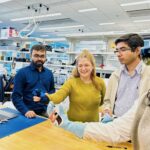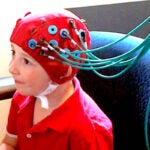Biomedical research at URI has already led to the development of instruments that will be used to help treat debilitating medical problems.
The average human brain has somewhere in the order of 100 billion neurons that control how we speak, walk, sleep, and feel. When those neurons misfire, medical problems like seizures or Parkinson’s Disease occur. Engineers at the University of Rhode Island are applying electrical engineering expertise, signal processing and instrumentation to the analysis of electrical signals from human nerves and their work is making an impact in the field of neuroengineering research. Tapping into the human nervous system allows the creation of brain-machine interfaces that can predict seizures, control prosthetics, and diagnose diseases.
URI researchers are also exploring the role of electrical signals in other systems and using that knowledge to find cures. Kunal Mankodiya is creating wearable systems that are capable of non-invasively tracking important patient metrics. Professor Ying Sun and Adjunct Professor Jack Salisbury are using ultrasound to learn more about the causes of sleep apnea. Associate Professor Fredrick Vetter’s research is shedding new light on electrophysiology’s role in heart attacks and cardiac diseases. And Professor Samantha Meenach is developing drug delivery vehicles capable of penetrating physiological barriers like tumors, the mucus barrier of the lung or the blood-brain barrier.
 Biomedical Graduate Pursues Pre-Med Track - Saying the University of Rhode Island always felt like home is probably an understatement for Joseph Confessore, ’25. Not only is he from just a town over in North Kingstown, but he attended alongside his twin sister, Mia, both carrying on the legacy of URI graduates in his family that started with his great-grandfather in […]
Biomedical Graduate Pursues Pre-Med Track - Saying the University of Rhode Island always felt like home is probably an understatement for Joseph Confessore, ’25. Not only is he from just a town over in North Kingstown, but he attended alongside his twin sister, Mia, both carrying on the legacy of URI graduates in his family that started with his great-grandfather in […] Could wearables be the future in diagnosing ADHD? - According to the National Institute of Mental Health, ADHD is one of the most common disorders diagnosed in children.
Could wearables be the future in diagnosing ADHD? - According to the National Institute of Mental Health, ADHD is one of the most common disorders diagnosed in children.
 URI researchers head international team exploring wearable technology to help stroke survivors - The three-year project is backed by a $500K grant from National Science Foundation.
URI researchers head international team exploring wearable technology to help stroke survivors - The three-year project is backed by a $500K grant from National Science Foundation. Cross-Disciplinary URI Team Forms Neuro-Learning Center - A URI team featuring Engineering Professor Kunal Mankodiya will establish a Neuro-Learning Center that will include cutting-edge equipment to study the relationship between brain activity and behavior, brain mapping, and neuroplasticity.
Cross-Disciplinary URI Team Forms Neuro-Learning Center - A URI team featuring Engineering Professor Kunal Mankodiya will establish a Neuro-Learning Center that will include cutting-edge equipment to study the relationship between brain activity and behavior, brain mapping, and neuroplasticity.
Faculty
Professor and Department Chair
Chemical, Biomolecular, and Materials Engineering
401.874.9518
gbothun@uri.edu
Distinguished Engineering Professor
Chemical, Biomolecular, and Materials Engineering
401.874.2804
bosea@uri.edu
Victor Baxt Professor
Chemical, Biomolecular, and Materials Engineering / Biomedical & Pharmaceutical Sciences
401.874.4303
smeenach@uri.edu
Associate Professor and Graduate Director
Chemical, Biomolecular, and Materials Engineering
401.874.2678
roxbury@uri.edu
Associate Professor
Electrical, Computer and Biomedical Engineering
401.874.5368
yalda_shahriari@uri.edu
Associate Professor and Graduate Director
Mechanical, Industrial and Systems Engineering
401.874.9067
cyuan@uri.edu










